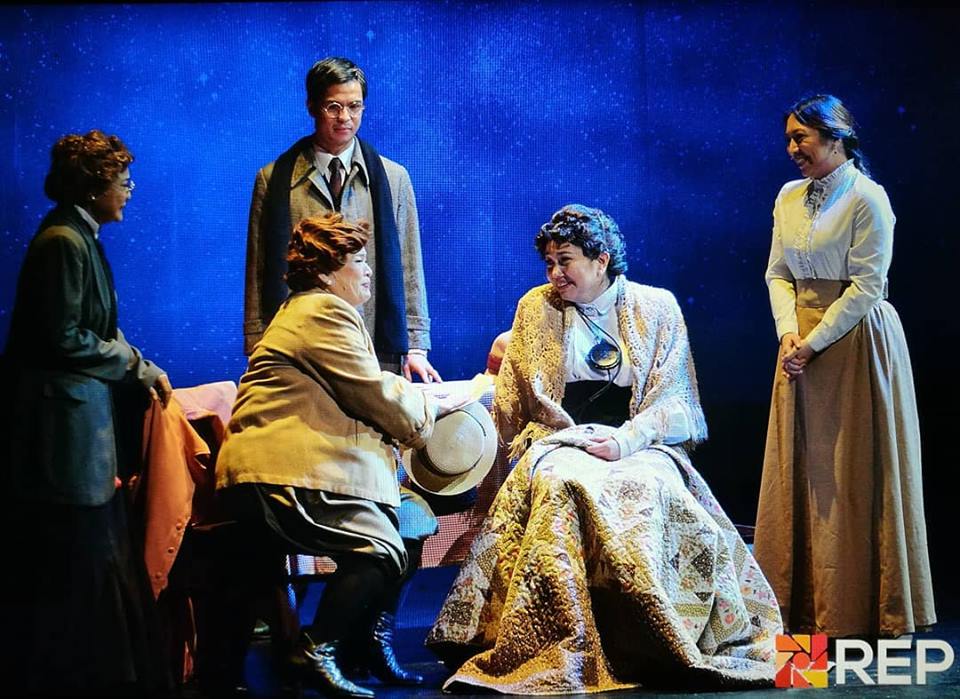
REVIEW: Unsung women no more in REP’s “Silent Sky”
When you’ve stood on the shoulders of giants all your life, it’s almost too easy to overlook the fact that the giants were, for the most part, male. This is why people need to hear more of the revolutionary women who had paved the way in their own fields. More than anything else, these stories remind people that even in the face of disenfranchisement, there is no doubt that women can—and that women always did.
Repertory Philippines paints a stellar feminist portrait of one Henrietta Leavitt, as she charged headstrong into the world of astronomy (and men). Most people only know as much about the stars as this little-known gamechanger; fortunately, like Henrietta, Lauren Gunderson’s Silent Sky is just as headstrong to change that.
A stellar woman
It’s 1893, Henrietta Swan Leavitt (Cathy Azanza-Dy) arrives at the Harvard Observatory College. Under the tutelage of a certain Dr. Pickering, she arrives more than ready to marvel at the universe’s vastness through the institution’s telescope. Cathy Azanza-Dy effortlessly brought Henrietta’s heartfelt passion to the stage, with the sensibilities of a female pioneer.
But just like any other woman (women in the US didn’t get to vote until about a year before Henrietta died in 1921) at the time, she is deemed underqualified and incapable, even if she had more than enough credentials to do as all the other men did. The male privilege permeating the field then is essentially personified in Peter Shaw (Topper Fabregas)—not a real person, by the way—who works as Dr. Pickering’s bumbling apprentice. Despite holding an esteemed position at the college, he saw passion as something “a bit excessive for physics”, effectively an embodiment of everyone Henrietta was not.
At the college, she meets two other strong-willed women: Scottish immigrant Williamina Fleming (Naths Everett’s humor is thoroughly infectious), and suffragist Annie Cannon (Sheila Francisco). In spite of all their significant contributions to the field, both of them seemed passively resigned to just doing the menial clerical work that the men wanted no part of. Henrietta, though appalled at the work, unfortunately had no other choice but to do as the other women did.
As she slowly drowned in her work, she began to discover blinking stars called Cepheids in patches of sky where no one has seen them before. Through the music of her sister Margaret Leavitt (Caisa Borromeo), Henrietta sees—or hears, rather—the pattern among these Cepheids, likening piano keys to the luminosity of stars. It’s this very breakthrough that allowed her contemporaries (and generations to come) to measure the distance between the Earth and virtually any point in the expanding universe.
Strained romance
Silent Sky was a simple and almost infallible character study of the female pioneer, covering as much ground as possible (from her motivations to her internal conflicts). There was somehow a foregoing of the nuanced for the straightforward in Henrietta’s moderately static characterization, but nothing ultimately unforgivable.
What felt unnecessary, however, was the gratuitous romance in the middle of it all. Fabregas and Azanza-Dy are not to blame (even if a different pairing might have had more chemistry)—it was how Henrietta and Peter were written that felt superfluous. The factitious arc seemingly attempted to make Henrietta more ‘human’, more dynamic, and capable of being someone other than the adamant, unyielding woman that she is; the thing is, the play (and Henrietta) might have been a lot better off without it.
Lauren Gunderson’s play runs roughly two long hours, but sustains enough traction until a very satisfying final scene (with lights by John Batalla which were nothing short of magical). For one, its script was perfectly crafted, although a tad too perfect for realism’s sake. It’s almost as though each exchange was plucked from the play’s best scene, with every line easily a quotable one. That said, the material’s wit (and heart, above everything else) still drove the narrative home, essentially becoming the source of the play’s inherent charm.
Henrietta Swan Leavitt is, without a doubt, one of the giants whose shoulders we stand upon to this day. The play is a delightful reminder that women have long been at the forefront. To all who personally bore witness to her prowess and unrelenting will, Henrietta is a woman who can; to the audience (and especially to generations of young women to come), Henrietta was a woman who did.
Silent Sky runs until March 25 at the Onstage Theater of Greenbelt 1.

